What’s the Big Deal About Natural Soap?
So, what’s up with all this natural soap hype?
You might be thinking, “Soap is just soap… right?”
Wrong.
Soap has been part of human history since 2800 BC, with the earliest evidence found in Ancient Babylon. Even the ruins of Pompeii revealed a soap-making workshop. For centuries, people made soap using simple ingredients — from rendered animal fats to wood ash — especially on the frontier, where every resource mattered.
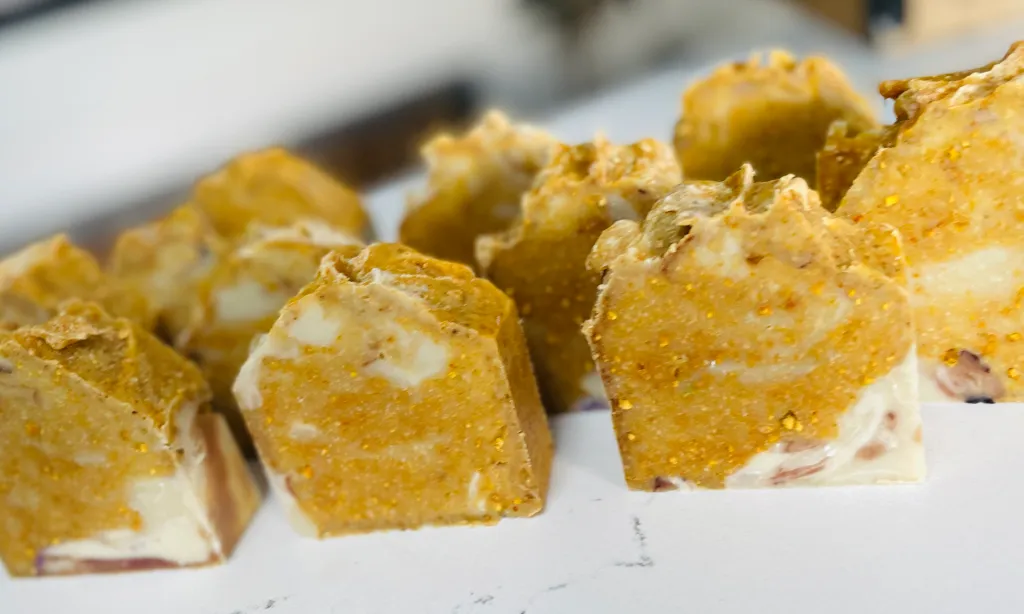
Fast-forward to today, and the tide is turning back. In our fast-paced, tech-driven world, more and more people are embracing handmade soap as part of a return to natural living. Whether it’s concerns about harsh chemicals or a desire for gentle, skin-loving alternatives, natural soap is gaining real momentum.
But is there really a difference between handmade and commercial soap?
Is natural soap actually better for your skin?
Let’s break it down so you can decide for yourself.
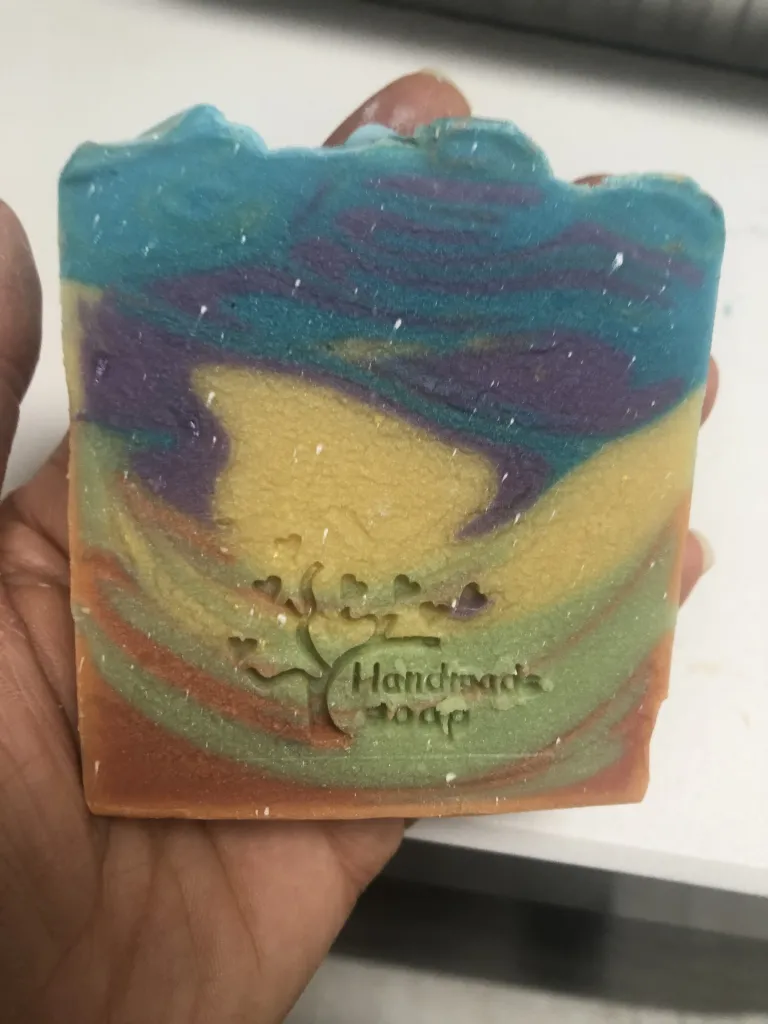
What’s So Bad About Commercial Soap Anyway?
You might be surprised to learn that many commercial “soaps” aren’t actually soap — they’re synthetic detergents. These detergents first appeared in 1916 Germany and became widely used during WWII when traditional soap ingredients were in short supply. Today, most mass-produced bars are made from petroleum-based synthetics that strip the skin of natural oils, potentially causing dryness, irritation, or even long-term skin imbalances.
1. Commercial Soaps Often Contain Harsh Additives
Even when you find a bar labeled as “soap,” the ingredient list may be anything but natural. Many commercial soaps are loaded with:
- Chemical-based colorants and dyes
- Synthetic fragrances and preservatives
- Artificial lathering agents
- Other mystery chemicals you can’t even pronounce
These additives are not skin-friendly. They can disrupt your skin’s microbiome, cause allergic reactions, and pollute water systems after being rinsed away.
2. Hidden Dangers: Triclosan and More
Some commercial soaps and body care products still contain triclosan, a chemical linked to hormonal disruption and potential cancer risk. It was once marketed as a “bacteria killer” but is now banned in many countries due to health concerns — and yet, you can still find it in some store-bought products, including soaps and toothpaste.
3. Commercial Soaps Remove Glycerin
During the soap-making process, glycerin is naturally formed — a skin-loving humectant that draws moisture into the skin. But here’s the catch: commercial manufacturers remove the glycerin to sell it separately or use it in moisturizers. So, the soap that was once nourishing becomes drying — and you’re sold a second product to fix the damage.
Pretty clever… and pretty unfair.
Up Next: What is Handmade Soap?
Now that you know what’s hiding in many store-bought soaps, let’s look at why handmade soap is making such a powerful comeback.
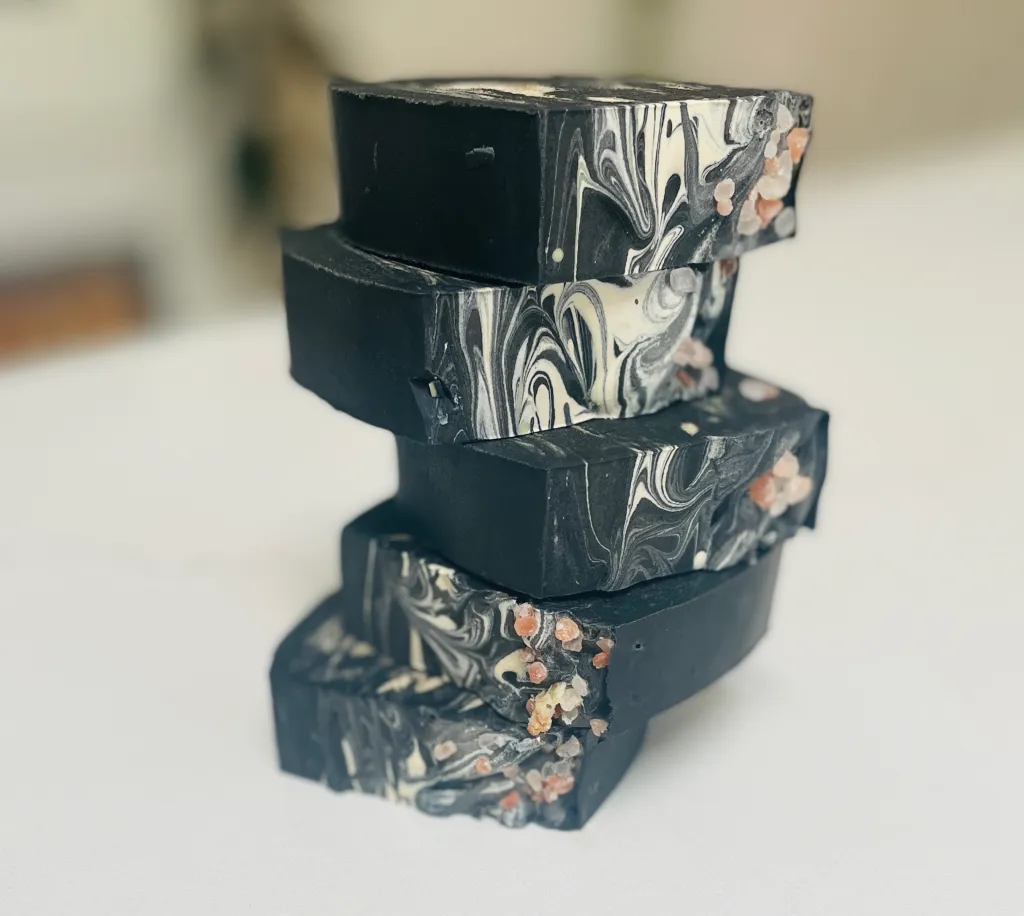
What Is Handmade Soap?
Handmade soap is a natural, skin-loving alternative to commercial bars — crafted through a time-honored, simple chemical reaction called saponification. That’s just a fancy word for what happens when fats or oils are combined with lye (sodium or potassium hydroxide) to create soap.
Yes, soap is essentially a salt of a fatty acid. And when made the traditional way, it’s a beautiful fusion of natural oils, butters, and glycerin — with no unnecessary additives or synthetic chemicals.
What Makes Handmade Soap Special?
Unlike mass-produced soap, handmade soaps are formulated with vegetable oils, plant-based butters, and sometimes animal fats, all rich in vitamins, antioxidants, and nutrients essential for healthy skin. Even better, handmade soap retains its naturally produced glycerin, which draws moisture to the skin and helps keep it soft, smooth, and hydrated.
Most handmade soap makers are passionate artisans who focus on adding goodness — not taking it out. That means you’re getting a product designed for nourishment, not just cleansing.
But Wait — Isn’t Lye Dangerous?
A common misconception is that soap made with lye is unsafe. In truth, lye is a vital part of the process, but none of it remains in the final product.
Here’s why:
- Lye (sodium hydroxide or potassium hydroxide) is fully neutralized during saponification.
- The result is a safe, balanced bar of soap with no residual lye — just creamy, gentle cleansing goodness.
Lye itself is derived from a natural source: historically made by leaching wood ash. Today, it’s used in a purified form to ensure safe and consistent soap-making.
Up Next: What Goes Into Handmade Soap?
Now that you know how real soap is made, let’s explore the ingredients that make it a luxury for your skin.
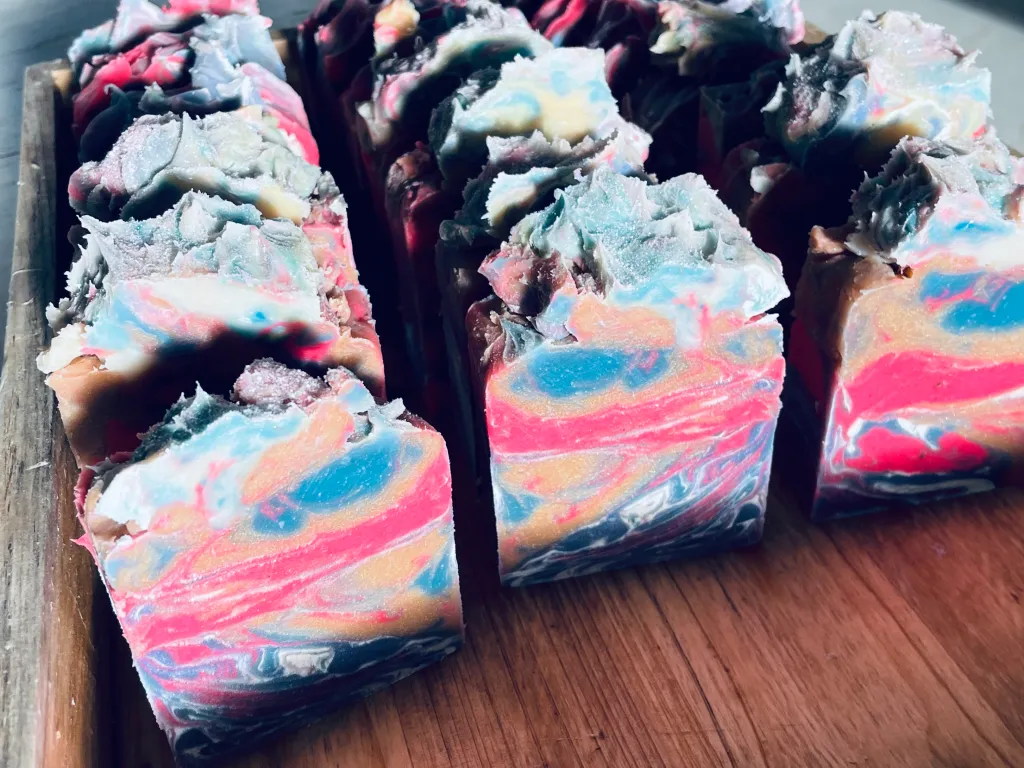
How to Know If Handmade Soap Is Truly Natural
Handmade soap is a beautiful blend of art and science. With endless combinations of oils, textures, scents, shapes, and colors, no two bars are ever exactly alike. That’s part of the magic. But beyond appearances, the ingredients are what truly matter.
A bar of soap should nourish your skin, not harm it. And unfortunately, not all handmade soap is natural or skin-safe — even if it’s labeled “handcrafted.”
Why Ingredients Matter Most
The real difference between handmade soap and commercial detergents lies in the purity of ingredients. If you make a beautiful handmade bar, then fill it with synthetic fragrance oils, artificial colorants, or chemical preservatives, you’ve lost the benefits of natural skincare.
True artisan soap is crafted with plant-based oils, butters, clays, essential oils, and botanicals — nothing synthetic, nothing harmful.
Not All Handmade Soap Is Natural
Surprisingly, some handmade soaps are made using “melt and pour” bases — pre-made chemical soap blocks that only require melting, adding fragrance or color, and molding. While it’s technically handmade, it’s not always natural.
Others may use synthetic dyes, fragrance oils, or preservatives for bright colors or candy-like scents. But remember — real pumpkin spice soap should be made with actual pumpkin puree and spice, not lab-created scent oils and orange dye.
How to Tell If Soap Is Truly Natural
Here’s a quick checklist to help you choose authentic, skin-safe handmade soap:
1. Read the Ingredients
Real soap should have a short list of understandable ingredients, like olive oil, coconut oil, shea butter, lye (sodium hydroxide), essential oils, clays, or botanicals.
Watch for:
- Long chemical names
- Artificial colorants (FD\&C dyes, mica with synthetic coating)
- “Fragrance” (vs. clearly listed essential oils)
Also check for any personal allergens like coconut, nut oils, or specific essential oils.
💡 Bonus: All ZenChemy Lab signature soaps are vegan (and we offer options for sensitive skin too, including Shea-free and Coconut-free lines).
2. Ask About Cure Time
Properly made cold-process soap needs time to cure — usually 4–8 weeks. This allows the bar to harden, ensuring a longer-lasting, gentler product.
A reputable soap maker will always know and respect their cure time.
3. Question Colors and Scents
Bright neon colors? Bubblegum scent? Probably not natural.
Ask the maker:
- How did they color the soap? (Natural infusions like turmeric, spirulina, or activated charcoal are great signs.)
- What gives it scent? (Essential oils vs. synthetic fragrances.)
If they mention herbal infusions, natural gels, or essential oil blends, you’re likely holding a quality bar made with intention and care.
Final Thoughts
Natural handmade soap is more than skincare — it’s a conscious choice for your health, the environment, and your daily ritual. When crafted well, it brings together beauty, purity, and purpose.
Choose wisely. Your skin will thank you.
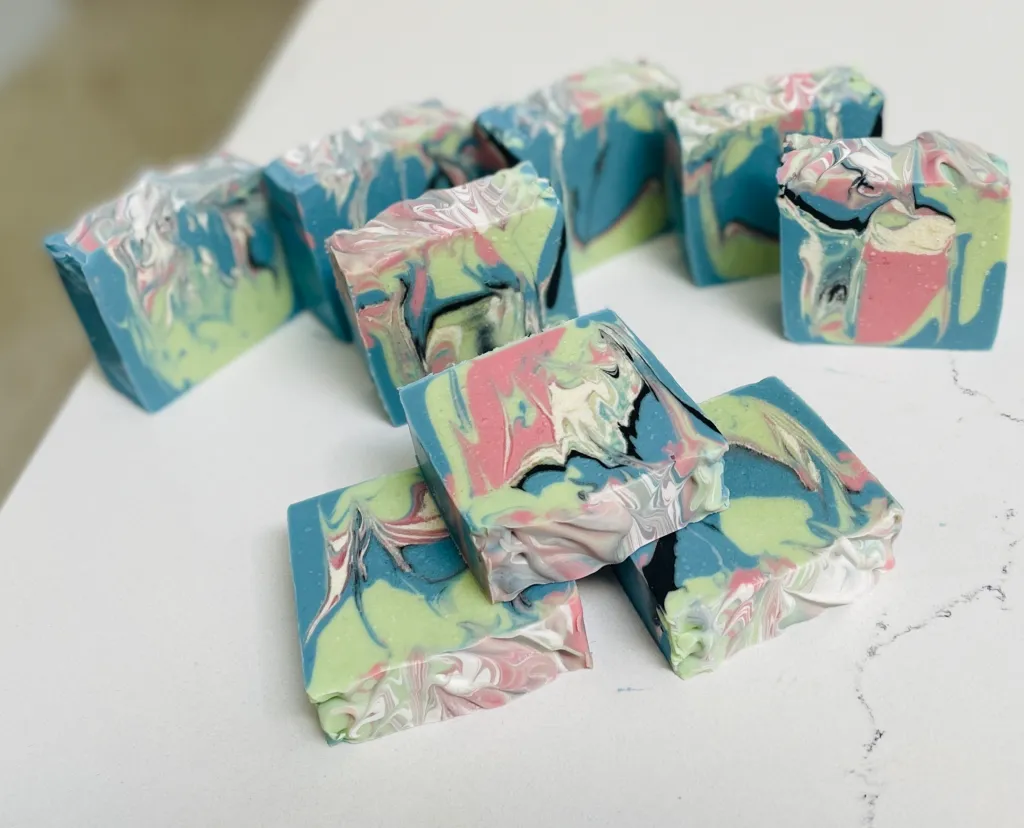
4. Natural vs. Organic: What’s the Difference?
It’s important to know that while “organic” is a regulated term (with USDA standards to back it up), the word “natural” isn’t. That means a soap labeled “natural” may still contain synthetic dyes, fragrances, or preservatives.
So don’t let labels fool you — always read the ingredients (see Tip #1!). A truly natural soap will be free from harsh chemicals and made with ingredients you can recognize and pronounce.
5. Try More Than One Bar
Skincare is personal — and so is soap. Factors like your skin type, whether you have hard or soft water, and your scent preferences all play a role in how a soap performs for you.
For example:
“My sister has hard water and loves my salted spa bar for its rich lather. I have soft water and prefer the unsalted formulas — they feel creamier to me.”
Don’t be afraid to experiment with a few different bars. That’s part of the joy of handmade soap — each one is an experience!
6. Talk to Your Soapmaker
Handmade soap isn’t one-size-fits-all. You might want different bars for different uses — one for your face, one for your hair, one for exfoliating feet, and one that really tackles kitchen odors.
That’s where the soapmaker (👋 that’s me!) comes in.
Tell me what you’re looking for, and I’ll help you choose the perfect bar — or even create a custom one just for you.
💌 Have a question? Email me anytime: angelica@zenchemylab.ca
Or use the live chat to start a conversation.
What Makes ZenChemy Lab Soaps Unique?
Let’s take a moment to explain what truly sets ZenChemy Lab apart from most handmade soap brands:
We make our soap 100% from scratch. No premade bases. No shortcuts.
Each bar begins with carefully selected high-quality vegetable oils, chosen for their benefits to the skin. We use the Cold Process method, which allows us to preserve the natural properties of the oils and butters. There are no synthetic additives, no artificial foaming agents, no hardeners, and no preservatives — making our soaps hypoallergenic and safe even for sensitive skin.
Finding soap this pure and artisanal in today’s market is like finding a gem in a hidden forest.
Our Ingredients: Pure and Powerful
ZenChemy Lab soaps are infused with generous portions of skin-loving ingredients such as:
- Shea butter, grapeseed oil, sweet almond oil
- Apricot kernel oil, wheat germ oil, olive oil
- Beeswax, coconut oil, hemp oil, and more
These ingredients don’t just cleanse — they nourish, hydrate, and support the skin’s natural barrier. With every use, your skin receives a gentle cleanse and a deep infusion of nutrients.
Final Thoughts
Natural handmade soap is more than a luxury — it’s a return to purity, to intention, and to the art of skincare done right.
Experience the difference for yourself.
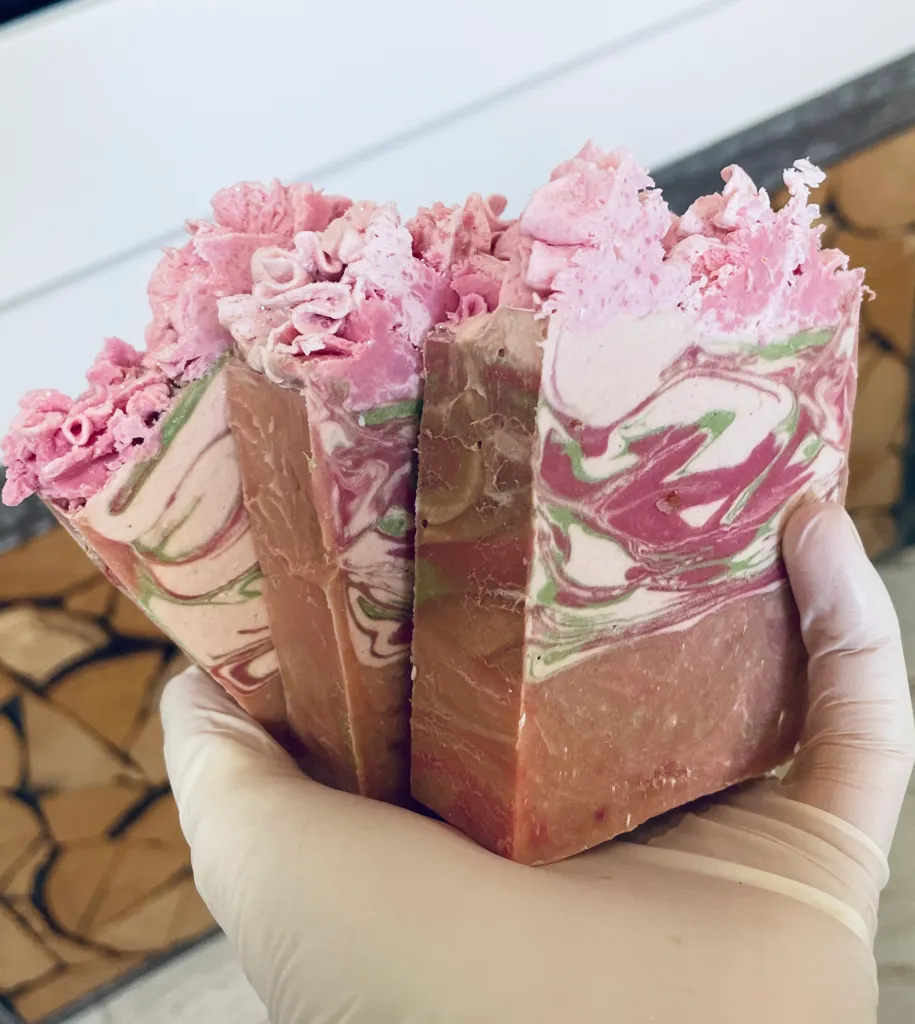
What’s Inside ZenChemy Lab Soaps?
At ZenChemy Lab, we go beyond the basics of soapmaking. Our formulas include natural, skin-nourishing additives like:
- Raw honey for its antibacterial and hydrating properties
- Activated charcoal for deep cleansing and detox
- Cream, coconut milk, and yogurt for a rich, moisturizing lather
- Natural clays and plant-based colorants for gentle exfoliation and beauty
Each ingredient is carefully chosen for its skin benefits — not just its aesthetic appeal.
Good for All Skin Types — Especially Sensitive, Aging, and Problematic Skin
Our soaps are formulated to suit a variety of skin needs, from normal and dry skin to acne-prone, mature, or sensitive skin types. By using high-quality oils rich in unsaponifiable compounds (like shea butter, wheat germ oil, and hemp oil), we ensure each bar delivers nourishment, soothing benefits, and a truly luxurious cleansing experience.
Skincare That Replaces the Need for Extras
The creamy, gentle lather of ZenChemy Lab soaps wraps your skin in moisture and care — often eliminating the need for a follow-up moisturizer. You may find yourself using fewer products, because your skin simply feels better, naturally.
Each of our 10+ soap varieties is crafted with a targeted purpose, offering specific benefits depending on your skin’s condition and needs.
Why Our Soap Costs More — And Why It’s Worth It
We invest in some of the most expensive and purest oils available in the natural skincare world — and you can feel the difference.
- No shortcuts
- No synthetic fillers
- Made from scratch using the Cold Process method
- Cured slowly over several weeks for optimal quality
Every batch is made by hand, in small quantities, to ensure freshness, effectiveness, and the highest standard of care.
Experience the Art of Real Soap
When you choose ZenChemy Lab, you’re not just buying soap — you’re investing in a ritual of care, in ingredients your skin recognizes, and in the power of nature at its best.
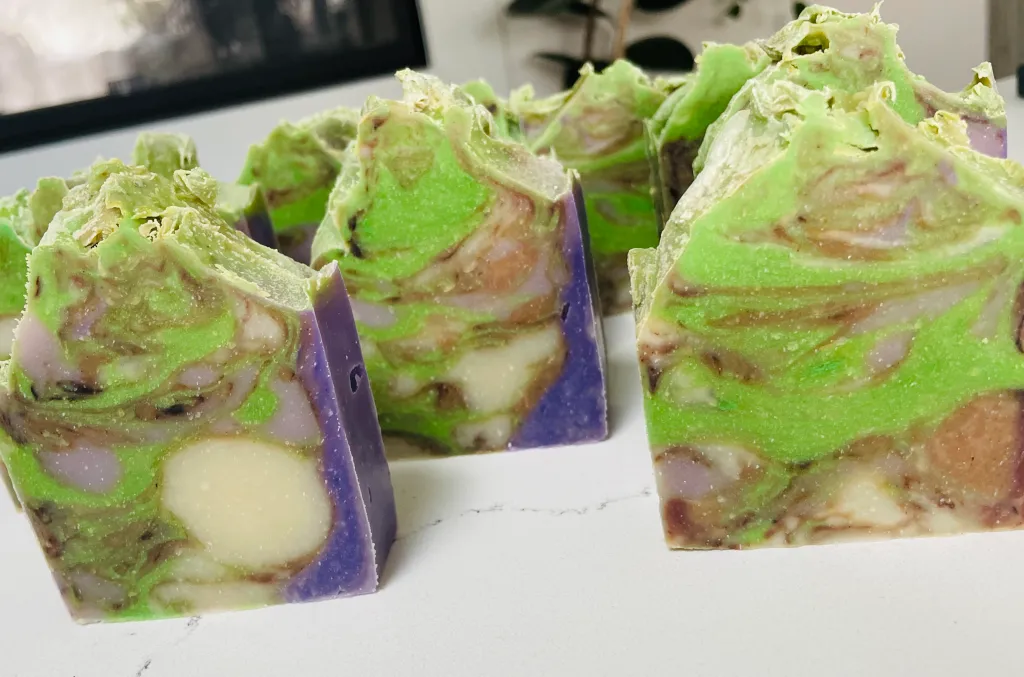


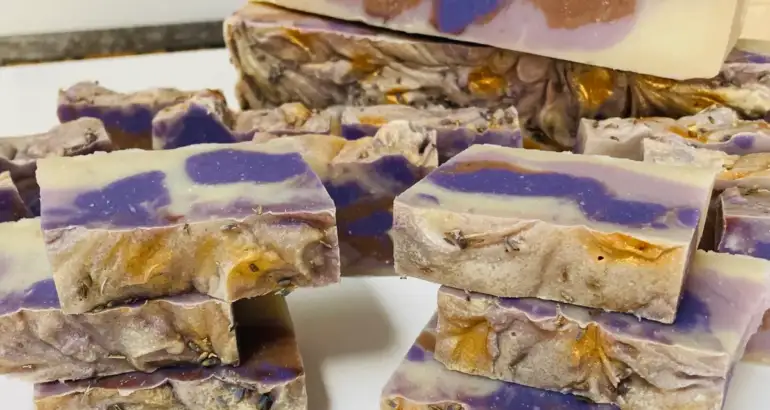
6 Comments
Eliminate Skin Tags Remover
I just could not leave your web site before suggesting that I really enjoyed the standard information a person supply to your visitors Is gonna be again steadily in order to check up on new posts
Eliminate Skin Tags Remover
Usually I do not read article on blogs however I would like to say that this writeup very compelled me to take a look at and do so Your writing taste has been amazed me Thanks quite nice post
Eliminate Skin Tags Remover
Thank you for the good writeup It in fact was a amusement account it Look advanced to far added agreeable from you However how could we communicate
Bradley Bartell
Great article! I really appreciate the clear and detailed insights you’ve provided on this topic. It’s always refreshing to read content that breaks things down so well, making it easy for readers to grasp even complex ideas. I also found the practical tips you’ve shared to be very helpful. Looking forward to more informative posts like this! Keep up the good work!
auto approve list
Wonderful blog! I found it while browsing on Yahoo News.
Do you have any suggestions on how to get listed
in Yahoo News? I’ve been trying for a while but I never seem to get there!
Thanks!
Snaptik
Good post. I learn something totally new and challenging on blogs I stumbleupon everyday. It’s always interesting to read through content from other authors and use a little something from other websites.